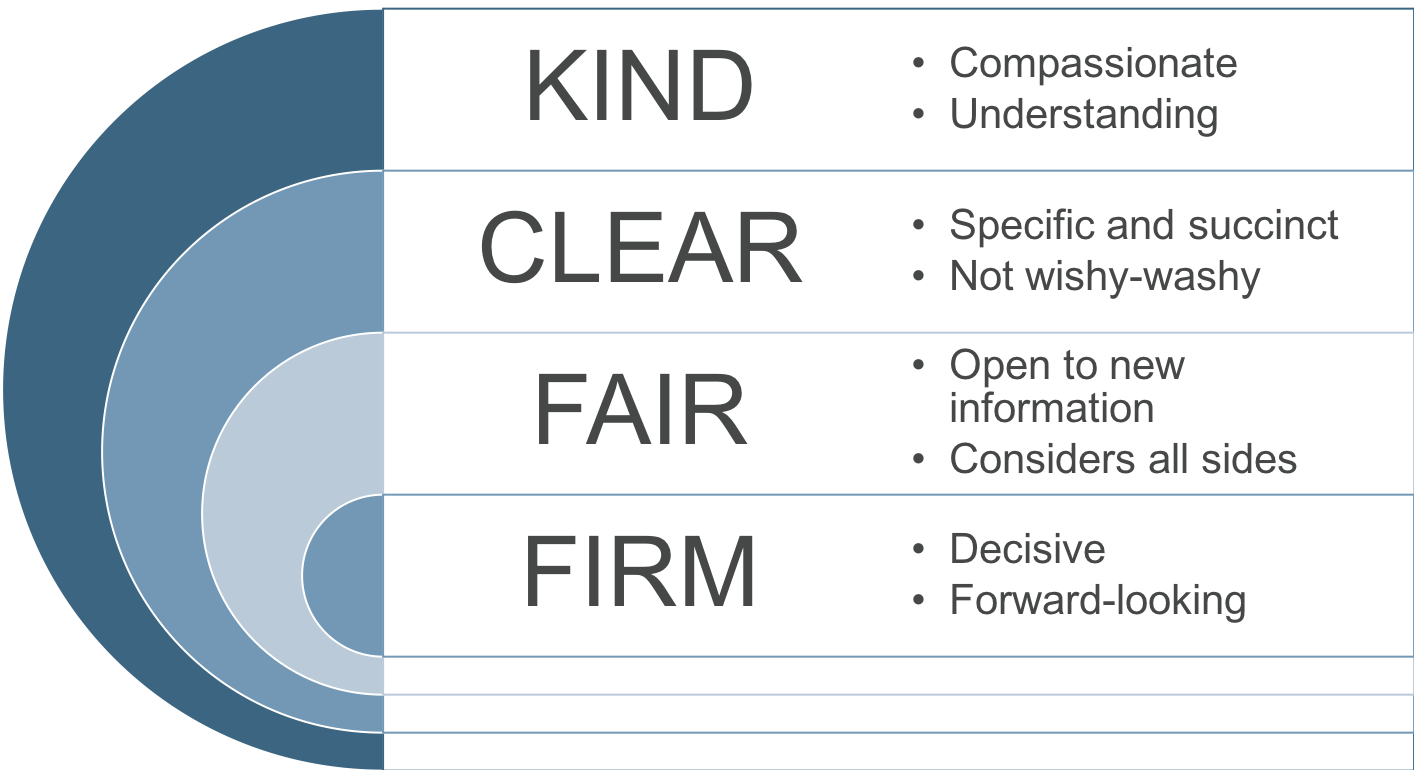A Leader’s Stance: Kind, Clear, Fair, and Firm
Your true goal as a leader is to be respected, not liked. If you are aiming to be liked, you will make compromises to accommodate people and you will be vulnerable to other people’s dramas rather than holding true to the goals and priorities for which you are responsible. Aim to be respected rather than liked. If you are kind, clear, fair and firm, your staff will trust and respect you. Ultimately, you will be liked and held in high regard, but these are the side benefits not the goals of effective leadership.
Over the years, I’ve found myself saying words like these to dozens of leaders. Often, when I least expect it, they quote them back to me, crediting this advice with rescuing them from worrying excessively about making everybody happy to their own detriment.
When it comes to leadership communication, to be effective you should always keep in mind these four things:
- Kind
- Clear
- Fair
- Firm
1. Kind: Through kindness, you will show that you care.
When faced with difficult decisions that affect others, you will do the right thing, whatever that means, but you will always operate from the intention to be kind. Whether giving honest feedback or delivering news of a lay-off or letting people know that bonuses will not be happening this year due to company economics, by choosing kindness, you will deliver your message with compassion, warmth and sincerity. The message may be difficult, but your delivery will honor the person receiving it. Being kind ensures that your team will feel connected, even when the message is tough.
2. Clear: What are you really saying? What do you need? What are your concerns?
A commitment to clarity means that you take the time to get clear about what you really want and what you want to communicate. If your answer is no, then you say it in a simple and straightforward manner (kindly, of course). If you aren’t sure, you say that you aren’t sure rather than asking for first one thing and then another — or worse, pretending you know when you don’t. You never hint about what you want. Rather, you ask for it in a direct way, being specific about what you are requesting, by when you’d like it done, by whom and any other conditions of satisfaction that you may have. When you strive to be clear in your communications and your intentions, it may take a little courage at first, but soon you’ll find that people feel they can rely on you for the truth and for directions or decisions they understand — whether or not they like them. Being clear is essential to earning the trust and respect of others.
3. Fair: Under the circumstances, what would be fair?
This question is a great way to stay on the path of fairness as you navigate complex, often politically charged issues. Fairness means considering all sides, stepping back to take in the bigger picture, and making your decisions with perspective that goes well beyond your own point of view. With fairness as a standard, you may decide to make an exception to a policy — or to uphold one because of the precedence it sets, even though you are moved by the persuasive plea for making the exception. With fairness as a standard, you may sometimes need to apologize and craft another solution. Or you may find yourself being generous when moments earlier, you thought you’d reached the end of your tolerance rope. What is fair, given everything? If you have a reputation for fairness, your colleagues will respect your balanced judgment and your consistency. Even if they are disappointed in your decision, they will respect and trust you. You may not ever hear about this respect, but, by modeling fairness, your integrity will be an example not easily forgotten.
4. Firm: You have been kind. You have been clear. You have been fair. But are you firm – or do you do the proverbial flip-flop?
Wishy-washy leaders are confusing. Employees often learn not to trust an initial decision and instead wait for the wind to blow you in a different direction. They may decide to do an “end run” around you to your boss because they aren’t sure whether you have the confidence or the authority to lead on a decision. While you may want to reconsider a decision from time to time in the interest of being fair, do make a conscious effort to commit to the path you’ve selected. Work out your doubts in private. Be careful not to let people “work on you” to get you to a different point of view, especially if you’ve given real thought to your decision or approach. Being firm means staying flexible, but standing strong. Think palm tree. Think palm tree in a gale force wind.
Kind. Clear. Fair. Firm. With this mantra in mind, you will rise beyond office politics and establish yourself as someone we can trust, respect and follow with confidence.




